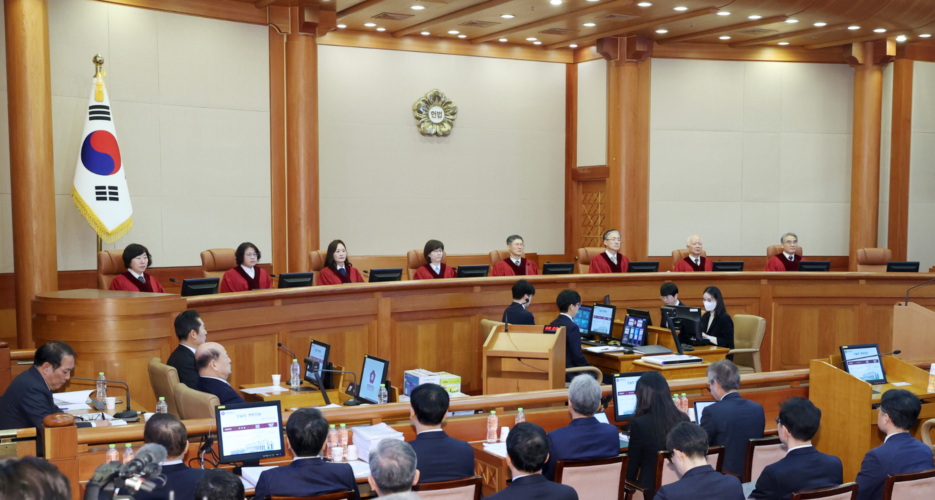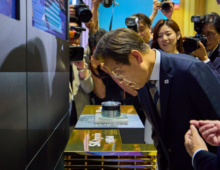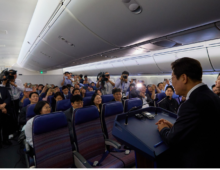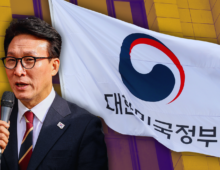|
Analysis Yoon’s impeachment trial nears verdict as political stakes continue to riseWith four hearings left, South Korea’s Constitutional Court faces pressure to rule on Yoon’s fate before mid-April Sooyoung OhFebruary 4, 2025  South Korea's eight Constitutional Court justices preside over President Yoon Suk-yeol's fourth impeachment hearing, Jan. 23, 2025 | Image: ROK Constitutional Court President Yoon Suk-yeol’s impeachment trial is entering a decisive phase, with just four hearings remaining before mid-February. Despite persistent objections and apparent delay tactics from Yoon’s legal representatives, the Constitutional Court has maintained its original schedule, underscoring its commitment to a swift resolution. The trial’s outcome carries major political implications, particularly with the possibility of a snap presidential election should Yoon be removed from office. While the court has expedited proceedings, the case remains complex due to the interplay of legal and political factors. The key questions center on whether Yoon’s declaration of martial law was a legitimate executive action, whether the conditions for invoking it were met and whether his directives undermined the constitutional order. A verdict by late February or early March would likely benefit main opposition Democratic Party leader Lee Jae-myung, giving him a clear path to the presidency. In contrast, a ruling in April could allow the ruling People Power Party more time to field a viable candidate — or even see Lee ruled out of the race if he is convicted in his own pending criminal trials. LATE FEBRUARY TO EARLY MARCH VERDICT Legal experts suggest Yoon’s impeachment case is relatively straightforward compared to past trials, with impeachment hinging on the three primary legal questions. Evidence against Yoon has steadily accumulated, with officials testifying that he bypassed Cabinet approval before issuing the martial law decree and personally ordered military forces to remove lawmakers from the National Assembly and detain key political figures. Despite objections from Yoon’s legal team, the court has accepted investigative materials from multiple authorities, including the Seoul Central District Prosecutors’ Office and the Defense Ministry’s internal prosecutors. Given the extensive documentation already in its possession, the court may see little need for prolonged deliberation. With the final hearing set for Feb. 13, a ruling could reasonably be expected by the end of the month. For comparison, the Constitutional Court took 10 days to issue a verdict in former President Park Geun-hye’s impeachment trial and 14 days in the case of former President Roh Moo-hyun. While Park’s trial involved 16 hearings and 36 defense witnesses, the court has accepted only six out of more than 24 requested by Yoon’s team, further signaling its intent to proceed without undue delay. As hearings progress, the court has adjusted its schedule to accommodate additional testimony. Court officer Cheon Jae-hyun told local media that some sessions may extend late into the evening, citing precedent from Park’s trial, which ran until 10 p.m. on multiple occasions.  President Yoon Suk-yeol delivers an address apologizing to the public for his short-lived martial law, Dec. 7, 2024 | Image: ROK Presidential Office LATE MARCH TO EARLY APRIL VERDICT Despite the court’s push for a timely ruling, several legal and political variables could delay the process. Regardless of the exact timing, the court is widely expected to issue a verdict before mid-April, as the retirement of two justices on April 18 necessitates a ruling before any changes to the bench. A delay beyond this point would complicate proceedings, as a six-member court would be unable to reach a credible verdict, and newly appointed justices would require time to review the case. According to Chang Young-soo, a professor at Korea University’s School of Law, if the trial extends past April, it could introduce legal complications that weaken the legitimacy of any ruling. “A six-member bench cannot render a credible decision, and newly appointed justices would need time to familiarize themselves with the case, potentially delaying the trial even further,” Chang told Korea Pro. CRIMINAL TRIAL INTERFERENCE Yoon’s simultaneous criminal trial presents another challenge. With weekly court appearances required for both cases, scheduling conflicts could arise, potentially slowing the impeachment process. Yoon’s legal team may even attempt to suspend the impeachment trial under Article 51 of the Constitutional Court Act, which allows proceedings to be paused if a related criminal case is ongoing. However, justices are unlikely to grant such a request, having repeatedly emphasized that impeachment is a constitutional matter separate from criminal proceedings and that they should take place concurrently. While Yoon’s legal team is considering all options, it has signaled that it prioritizes the impeachment trial over the criminal case, arguing that the criminal investigation itself is illegitimate. Given the impeachment hearings provide Yoon with a televised platform to defend himself and rally political support, he is likely to continue appearing at the Constitutional Court while seeking bail in the criminal case.  South Korean martial law troops attempt to enter the National Assembly, Dec. 4, 2024 | Images: Lee Jae-myung via Twitter PROCEDURAL OBJECTIONS From the outset, Yoon’s defense team has raised procedural objections, arguing the court violated due process by scheduling multiple hearings without prior consultation and accepting prosecutorial records, which the president’s lawyer argue do not meet the threshold, as evidence. For instance, while the National Assembly has accused Yoon of inciting insurrection and unconstitutional actions, presenting CCTV footage and investigation records, Yoon’s defense team argues that prosecutors have relied on media reports rather than presenting concrete evidence. The bench has dismissed these objections, along with Yoon’s petition for three justices to recuse themselves over alleged political bias. Still, the question of fairness of the proceedings remains a contentious issue. Yoon’s lawyers have insisted that related cases — such as the impeachment of Prime Minister Han Duck-soo and the constitutionality of Acting President Choi Sang-mok’s truncated judicial appointments — should be reviewed first. The court has expedited hearings for these cases, scheduling them between Yoon’s semi-weekly trial dates. CONFLICTING TESTIMONIES Conflicting testimonies could also prolong proceedings. While prosecutors argue Yoon directly ordered lawmakers to be removed from the National Assembly, former Defense Minister Kim Yong-hyun contradicted his earlier testimony by stating that the president ordered martial law troops to remove “agents” (요원) from the National Assembly, not “lawmakers” (의원), suggesting that troops misunderstood the president’s order as the two words could sound similar to each other. Chang of Korea University notes that resolving these inconsistencies is critical to the trial’s credibility. “If the Constitutional Court does not properly review testimonies but later, in the criminal trial, witness statements confirm that President Yoon never issued the order to remove lawmakers from the National Assembly, the legitimacy of the Constitutional Court’s ruling would be damaged,” Chang said. The court has only partially approved Yoon’s extensive witness list but says it is continuing to review additional candidates. If more witnesses are selected, it would be necessary to schedule additional hearings beyond Feb. 13 to cross-examine conflicting statements.  President Yoon Suk-yeol appoints Kim Yong-hyun as defense minister, Sept. 6, 2024 | Image: ROK Presidential Office ELECTION FRAUD ALLEGATIONS Yoon has also introduced claims of election fraud to justify his martial law declaration, citing unverified reports of ballot manipulation and Chinese cyber interference in last year’s general election. While the court has agreed to review related materials and testimonies — likely to demonstrate impartiality — it has denied Yoon’s request to verify voter numbers, indicating reluctance to conduct a broad electoral investigation that could significantly prolong the trial. Chang argues that revisiting election data carries risks. “Since it is nearly impossible for voter counts to be 100% precise, minor discrepancies could have been misconstrued as evidence of fraud. If the margin of error turned out to be larger than expected, it could have triggered a major controversy,” he said. IMPLICATIONS While Yoon’s election fraud claims appear unlikely to gain traction in court, their political significance cannot be ignored, as they may shape public perceptions of the trial’s legitimacy. Moreover, public opinion on Yoon’s impeachment has shifted. The declining support for impeachment, particularly among centrist and moderate voters, may weigh on the justices, making them more cautious in their approach. As the trial nears its conclusion, the Constitutional Court faces mounting pressure to deliver a ruling perceived as fair and legally sound. Moving too quickly, which would benefit Lee Jae-myung, could fuel allegations of political bias, while excessive delays, which would benefit the ruling party, may be interpreted as succumbing to pressure from the president’s camp. Beyond domestic politics, the ruling will test South Korea’s institutional resilience. The impeachment process has already exposed deep political divisions, and how the court navigates this case could influence public confidence in the judiciary for years to come. Whether Yoon is removed or survives the challenge, the trial’s outcome will set a precedent for future constitutional crises in South Korea. Edited by John Lee President Yoon Suk-yeol’s impeachment trial is entering a decisive phase, with just four hearings remaining before mid-February. Despite persistent objections and apparent delay tactics from Yoon’s legal representatives, the Constitutional Court has maintained its original schedule, underscoring its commitment to a swift resolution. The trial’s outcome carries major political implications, particularly with the possibility of a snap presidential election should Yoon be removed from office. Get your
|
|
Analysis Yoon’s impeachment trial nears verdict as political stakes continue to riseWith four hearings left, South Korea’s Constitutional Court faces pressure to rule on Yoon’s fate before mid-April  President Yoon Suk-yeol’s impeachment trial is entering a decisive phase, with just four hearings remaining before mid-February. Despite persistent objections and apparent delay tactics from Yoon’s legal representatives, the Constitutional Court has maintained its original schedule, underscoring its commitment to a swift resolution. The trial’s outcome carries major political implications, particularly with the possibility of a snap presidential election should Yoon be removed from office. © Korea Risk Group. All rights reserved. |











